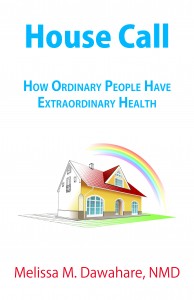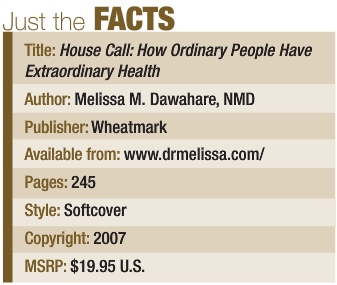Book Review: House Call- How Ordinary People Have Extraordinary Health
Stacie Deyglio, ND
 Dr. Dawahare has created a book containing detailed instruction for following her Four Rooms of Health theory. Basing this theory off of an Indian proverb, Dr. Dawahare views health as the daily practice of caring for each of the four rooms: the physical room, the mental room, the emotional room and the spiritual room. House Call, How Ordinary People Have Extraordinary Health is her informative guide and workbook that leads patients to a deeper understanding and practice of health and wellness.
Dr. Dawahare has created a book containing detailed instruction for following her Four Rooms of Health theory. Basing this theory off of an Indian proverb, Dr. Dawahare views health as the daily practice of caring for each of the four rooms: the physical room, the mental room, the emotional room and the spiritual room. House Call, How Ordinary People Have Extraordinary Health is her informative guide and workbook that leads patients to a deeper understanding and practice of health and wellness.
“As people are inspired and empowered by this knowledge, they take control over their healthcare options. It is time for patients and physicians alike to begin to treat themselves as whole persons to solve chronic disease problems. Viewing health as a house with four rooms opens the door to living a pain-free life with less stress and more balance” (p. 4).
The first half of the book is comprised of six chapters, including an introduction, a discussion of each of the four rooms and a conclusion. The second half of the book provides the critical-thinking applications of the first six chapters. This includes seven appendices arranged in a workbook context augmenting the Four Rooms of Health theory, guiding the reader through the process.
“This book is more than just a ‘how-to’ book. It is a complete system for health and wellness. At any given point in time you are doing the best you can with what resources and housecleaning supplies you have. If you tidy each room of your house daily, you will have better health than you did the previous day” (p. 17).
 As a succinct manual for health and wellness, Dr. Dawahare’s book best supports the naturopathic principle of Tolle Totem. The paradigm in conventional medicine is for a patient to present with physical symptoms, have a seven-minute office visit and be prescribed a pharmaceutical treatment to suppress symptoms. In this model there is no opportunity to learn about the totality of the patient and address other ongoing issues. Dr. Dawahare’s book offers an optimistic substitute to this paradigm, engaging the patient on a deeper level to support the daily habit of making healthy lifestyle changes.
As a succinct manual for health and wellness, Dr. Dawahare’s book best supports the naturopathic principle of Tolle Totem. The paradigm in conventional medicine is for a patient to present with physical symptoms, have a seven-minute office visit and be prescribed a pharmaceutical treatment to suppress symptoms. In this model there is no opportunity to learn about the totality of the patient and address other ongoing issues. Dr. Dawahare’s book offers an optimistic substitute to this paradigm, engaging the patient on a deeper level to support the daily habit of making healthy lifestyle changes.
“Imagine you are with your realtor shopping for a new home. You walk into one room of the house and view it. The realtor stops and asks you to sign the contract for the home without seeing the rest of the rooms. This would be similar to a specialist asking you to take a medication for insomnia without asking about your stress level and your mental and emotional health” (p. 4). In this way, her book earmarks a well-lit path any person can follow on his or her way out of chronic disease and back into the light of health.
 Stacie Deyglio, ND received her baccalaureate degree in biology with a minor in chemistry from the College of Mt. St. Vincent in New York. Her personal health issues paved the way to discovering naturopathic medicine in 1999. Resonating with the philosophy and principles of naturopathic medicine, Dr. Deyglio graduated from the University of Bridgeport, College of Naturopathic Medicine in 2003. As a medical student, she was involved in student government, fundraising and the generation of two successful student-run health fairs. Dr. Deyglio’s interests include relating integrative therapeutics to the health of pediatric and geriatric populations. Currently residing in Phoenix, Dr. Deyglio is an avid bookworm, and is actively creating her practice.
Stacie Deyglio, ND received her baccalaureate degree in biology with a minor in chemistry from the College of Mt. St. Vincent in New York. Her personal health issues paved the way to discovering naturopathic medicine in 1999. Resonating with the philosophy and principles of naturopathic medicine, Dr. Deyglio graduated from the University of Bridgeport, College of Naturopathic Medicine in 2003. As a medical student, she was involved in student government, fundraising and the generation of two successful student-run health fairs. Dr. Deyglio’s interests include relating integrative therapeutics to the health of pediatric and geriatric populations. Currently residing in Phoenix, Dr. Deyglio is an avid bookworm, and is actively creating her practice.










